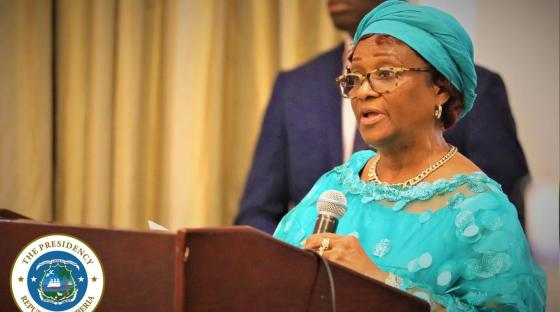Liberia: Are NEC’s Pre-campaign Penalties Stiff Enough?

Davidetta Brown Lansanah, Chairperson of the National Elections Commission
— All eyes are now on the electoral body to see how it would respond to the President’s flagrant violation of the country’s election law.
The National Elections Commission (NEC) has warned of severe punishment for any presidential and legislative aspirants caught pre-campaigning.
According to the electoral body, the punishment would be announced during the candidate registration period, which is just weeks away.
The warning from NEC comes as billboards and flyers from candidates are posted all over cities across the country. Most are cleverly designed as civic voter education messages, though they are essentially campaign messages on behalf of their respective candidates.
Most notable among those in violation of the NEC’s warning are the hundreds of banners and billboards lining the streets of Monrovia in favor of Presidential Goerge Weah of the ruling Coalition for Democratic Change.
The party’s campaign billboards and banners clearly marked with “George Weah 2023, Change You can count on” have inundated the city since February this year, when he formally accepted his party’s nomination to seek a second presidential term.
With the NEC’s latest warning, all eyes are now on the electoral body to see how it would respond to the President’s flagrant violation of the country’s election law.
According to Davidetta Brown Lansanah, any aspirant whose posters or billboards bearing campaign messages remain visible until the candidate nomination, which is expected to run from June 14 to July 14, will have himself or herself to blame as punitive action will be taken.
She noted that the electoral body has begun documenting violations of campaign regulations governing political campaigns across the country.
“The Commission,” Lansanah says, would not relent to enforce the 2023 revised and published guidelines on campaign letters once a violation is proven.
“The Commission also reiterates that the campaign period of the 2023 Presidential and Legislative elections is August 5 to 8 October 2023,” she said. “The NEC is warning that any campaign activities done before the campaigning period are considered pre-campaigning, punishable by a fine of not less than US$1,000 or more than US$5,000.”
Given the penalties stated, it is not lost on the public — especially the opposition parties — that even the maximum penalty of US$5,000 would be a tiny price to pay for the ruling party to continue in violation of the election law against pre-campaigning.
The real question is whether the NEC is willing to apply stiffer penalties to ensure that those political parties (and candidates) with deeper pockets, who violate the law against pre-campaigning, do not get off with a fine that appears to be nothing more than a slap on the wrist.
However, Lansanah did not state whether punishment for campaign violation would result in candidate disqualification.
Meanwhile, the NEC has disclosed that it has begun the deduplication process for phase one of the biometric registration exercise which took place in six counties.
The process aims to remove multiple registrants and clean the voter roll to ensure trust in the election process.
“Deduplication and adjudication of the voter registration records from the six counties in Phase One are ongoing at the NEC Data Center," Lansanah.
“The aim of this exercise is to remove all instances of multiple registrations and other data cleansing processes, including the identification and removal of underage registrants.
The Commission, Lansanah said, has opened its doors to duly accredited observers and stakeholders, including political party technicians to observe the process.
Phase one counties, according to the electoral body, produce a preliminary number of registered voters of little over 1.4 million people.
Of this number, 711,410 are females, while 723,799 are males, NEC data shows. But the figures are subject to change depending on the outcome of the deduplication and adjudication processes, the electoral body noted.
The first phase, which ended more than two weeks ago, was marred by technical glitches, including shortages of biometric cards that prevented some Liberians from registering.
However, NEC claimed that the overall impact of the technical glitches on the turnout of the biometric voter registration exercise was minimal.
But electoral experts disagree, saying that the total number of registered voters in the first phase would have been higher if the problems had existed throughout the registration period.
Lansanah has also noted that even though there are challenges facing the second phase of the biometric registration process in nine counties, the process is going as planned.
Phase two is expected to end on May 11.
The NEC has moved to use biometric equipment for its voter registration process to streamline the electoral process and reduce the potential for double registration and other forms of voter fraud after coming under pressure to ditch its optical manual registration (OMR) system.
The OMR system, for many, does not improve the accountability and transparency of electoral processes and is usually tainted by controversy and mistrust.
The biometric, which is also not a silver bullet, according to many experts, is seen as a safe route to produce a credible voter roll void of double registration.
